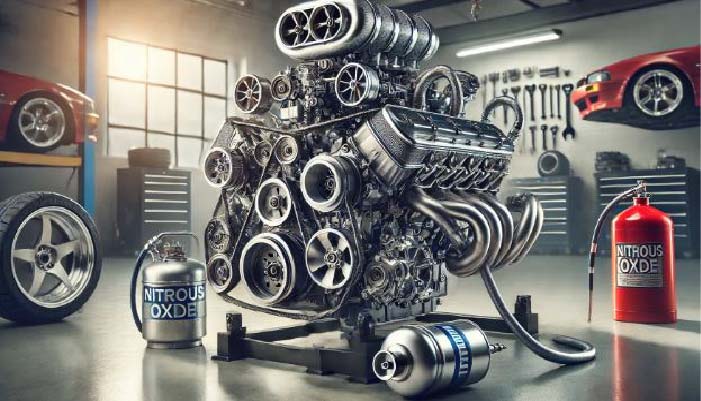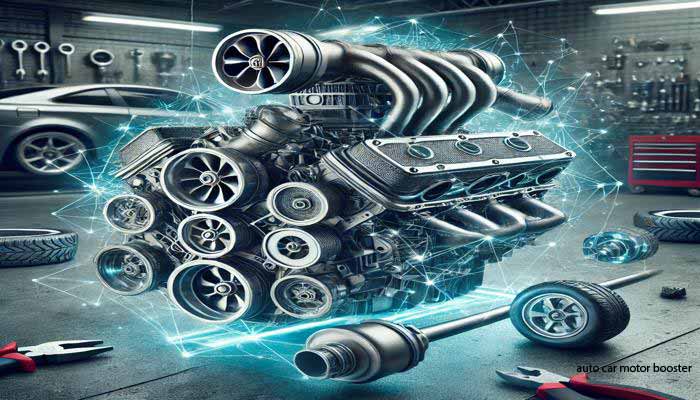
Introduction
Car enthusiasts are always looking for ways to improve their vehicle’s performance. One of the most common ways to achieve this is by increasing the horsepower. While there are multiple methods available, using engine boosters is a popular choice. In this article, we’ll explore how you can increase your car’s horsepower using engine boosters, explain their types, and discuss the benefits and key considerations.
What Are Engine Boosters?
Engine boosters are performance-enhancing products designed to increase the power output of an engine. They typically involve chemical additives or mechanical devices that can modify or enhance an engine’s combustion process, resulting in more power. Whether you’re using octane boosters, nitrous oxide, or turbochargers, each type of engine booster has its unique benefits and drawbacks.
How Engine Boosters Work
Engine boosters work by optimizing fuel combustion or by adding extra oxygen to the fuel mixture, enabling the engine to generate more power. For instance, nitrous oxide injects oxygen into the combustion chamber, allowing for more fuel to burn. In contrast, octane boosters increase the octane rating of the fuel, which helps prevent engine knocking, thus enabling the engine to run at higher compression ratios and produce more power.

Types of Engine Boosters
- Octane Boosters: These increase the fuel’s octane rating, allowing the engine to perform better by reducing the likelihood of knocking.
- Nitrous Oxide Systems (NOS): This method involves injecting nitrous oxide into the engine to significantly boost horsepower in short bursts.
- Turbochargers: These use exhaust gases to compress air going into the engine, thereby increasing the engine’s efficiency and power output.
- Superchargers: Similar to turbochargers, but superchargers are belt-driven, providing an immediate boost in power without the lag typically associated with turbochargers.
- Fuel Additives: These chemicals are added to the fuel to clean the engine and improve fuel efficiency, indirectly boosting engine performance.
Benefits of Using Engine Boosters
- Increased Horsepower: Engine boosters can increase horsepower by improving combustion efficiency or adding more oxygen to the fuel mixture.
- Better Acceleration: With more power available, your car will accelerate faster, giving you a more responsive and thrilling driving experience.
- Improved Fuel Efficiency: Some boosters help clean the engine, improving overall fuel consumption, leading to better mileage.
- Cost-Effective Performance Enhancement: Compared to upgrading your engine or other significant modifications, using engine boosters is a relatively affordable way to boost performance.
How to Increase Horsepower with Engine Boosters
Increasing horsepower using engine boosters can be done in various ways depending on the type of booster you choose. Below are some of the most effective options:
- Octane Boosters: Using an octane booster will raise the fuel’s octane level, preventing knocking and allowing the engine to run at higher compression ratios. This can lead to a moderate increase in horsepower, particularly in high-performance engines.
- Nitrous Oxide Systems: Nitrous oxide injects oxygen into the combustion chamber, which enables more fuel to burn and provides an immediate boost to horsepower. Be mindful that NOS systems need to be installed correctly and safely to avoid engine damage.
- Turbochargers and Superchargers: Both turbochargers and superchargers force extra air into the combustion chamber, which increases the engine’s power output. These are among the most reliable ways to get a significant boost in horsepower.
- Fuel Additives: While not as aggressive as turbochargers or NOS systems, using fuel additives to clean the fuel system can lead to improved engine efficiency, resulting in a minor power increase.
Key Considerations Before Using Engine Boosters
- Compatibility: Not all engines are compatible with every type of engine booster. Always ensure your engine can handle the specific booster you’re considering.
- Engine Condition: Engine boosters work best when the engine is in good condition. If your engine has significant wear and tear, boosters may cause more harm than good.
- Installation: Some engine boosters, like turbochargers or NOS systems, require professional installation to ensure they work properly and safely.
- Legal Restrictions: Some types of engine boosters, particularly NOS systems, may not be street-legal in certain regions. Always check your local laws before installing these systems.
FAQs
1. What is the safest way to increase horsepower with an engine booster?
The safest way is to use octane boosters or fuel additives, which have minimal risk of causing damage to the engine. These methods are ideal for mild horsepower boosts.
2. Are engine boosters legal for street use?
It depends on the type of booster and your location. Octane boosters and fuel additives are usually legal, but nitrous oxide systems may be restricted in some areas.
3. Can using engine boosters harm my engine?
If used correctly and in the right engine, engine boosters are safe. However, improper use or overuse of boosters like nitrous oxide can lead to engine damage.
4. How much horsepower can I expect to gain with engine boosters?
The horsepower gain depends on the type of booster and your engine. Turbochargers and NOS systems can provide significant increases, while octane boosters may offer a more moderate improvement.
5. Do engine boosters affect fuel economy?
Some engine boosters, like fuel additives, can improve fuel economy by cleaning the fuel system. However, boosters like nitrous oxide may reduce fuel economy during use.
If Like This Article Visit Our Website. Collect From Wekiapedia